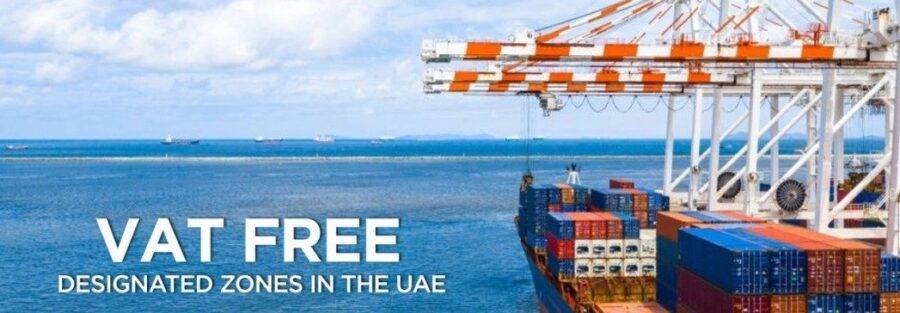Under the VAT Laws, Federal Tax Authority has nominated three more VAT-free zones, which are called “Designated Zones”. With the addition of the three latest zones, the total number of Designated Zones in the UAE has reached to twenty-three. I believe this is great news for existing and new businesses looking to invest in these Designated Zones, where they won’t be liable to five percent VAT applicability.
New Designated Zones in the United Arab Emirates
International Humanitarian City Jebel Ali, Dubai is one of the three new Designated zones, whereas, the two other zones include Al Butain International Airport Free Zone and Al Ain International Airport Free Zone, Abu Dhabi.
For specific supplies of goods, there Designated Zones, are treated outside the territory of the UAE for VAT purposes.
Entities within a Designated Zone
The place of residence will be considered in the UAE for VAT purposes for businesses who are registered or established in the Designated Zone. This means that even though a business may be operating in the Designated Zone, its place of residence will be considered as onshore for VAT purposes, however, some of its goods supplies may be outside the scope of VAT.
Supply of Services
As per Article 51(6), Executive Regulations, the place of supply of services will be considered as within the UAE for businesses supplying services in the Designated Zone. This means that the place of supplies for all services supplied in designated zones will override the normal place of supply and considered within the UAE. Subsequently, this means that most supply of services made from the Designated Zones will be liable at standard 5% rate of VAT, except for when the services are exported to an entity, individual outside the GCC implementing state, at which point the supply of services will be Zero-rated.
Supply of Goods within a Designated Zone
The default rule for supplies of goods within a Designated Zone is that such supplies fall outside the scope of UAE VAT.
The conditions levied for all Designated Zones
A general criterion has to be met by the designated zones, to be considered as falling outside the UAE VAT implementation. This includes:
– The geographical area of the designated zone must be clearly demarcated
– The designated zone must have stringent security measures put in place to track the entry and exit of goods and individuals to and from the area
– The designated zone must have the internet capacity to process and store goods within its boundaries
– The operations of the designated zone must comply with the rules laid out by the deferral tax authority (FTA)
The above-mentioned criteria are mandatory to follow for all designated zones and failure to comply with any of these rules in full or part of the designated zone will result in that part of the area considered as part of the state with standard VAT implementation.
Important Benefits in Store for Businesses Operating in VAT-free Zone
The addition of three more zones into the list of Designated Zones (VAT Free Zones) brings many benefits to the businesses operating within the boundaries of these zones. Since these zones are defined as outside the state of UAE for VAT Purposes, businesses are entitled to the following benefits:
– All supply of goods within these zones are outside the scope of VAT
– Export of goods from Designated Zones don’t incur any tax
– Supply of goods from Designated Zones within the GCC nations aren’t liable to tax
– Import of goods into the designated zones are not taxable
With all these benefits on offer for businesses, it is important for all businesses operating within the Designated Zones to comply with the criteria set out for their eligibility. Also, businesses need to be aware of the supplies that are liable to VAT even within the designated zones.
TRANSFERS OF GOODS INTO A DESIGNATED ZONE
Transfers from outside the UAE:
The transfer of goods from outside UAE into the Designated Zone falls outside the scope of UAE VAT
Transfers from mainland UAE:
As per Article 30(3), the supply of goods from within the UAE into the Designated Zone doesn’t count as export and thus such movements do incur standard VAT rate
Transfers between Designated Zones:
Transfer/movement of goods between two designated zones will be considered outside the scope of VAT, provided the following criteria as per Article 51(4) is met:
– The goods aren’t used or altered in part of in entirety during the movement between the Designated Zones
– The movement of goods is undertaken in compliance with the GCC Common Customers Law
Import of goods from Designated Zones
The movement/transfer of goods into the UAE from the Designated Zone is considered as import and the VAT for such import is payable by the importer
In cases, where a person pays VAT for the purchase of goods within a Designated Zone and then pays VAT again for the import of the same goods, the registered person will be able to reclaim VAT refund for the input VAT incurred on the import of the goods into the UAE in full.
Supplies following importation
It is important to note that there can be cases where a VAT is levied on the import of goods from the designated zone into the state and again on the sale of goods within the UAE on the date of supply of the sale. The VAT liability on such sale will be influenced by the date of supply for the sale, which is to be determined on a case to case basis.





